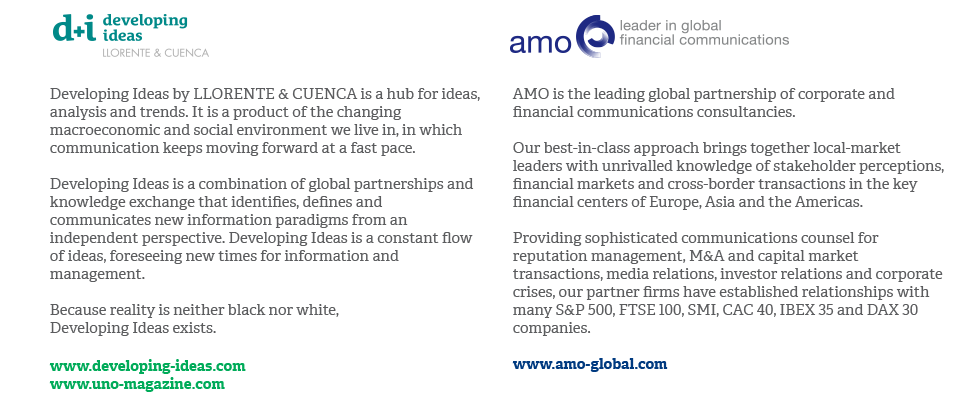During the recent Council of the Americas Symposium & BRAVO Business Awards, held in Miami, there was debate regarding the current role of sustainability in organizations. It was an extensive discussion among many outstanding business leaders, who offered their views on this cornerstone, which has become fundamental for development.
The relationship between sustainability, brand management and active audiences is getting closer and closer. To this end, organizations’ stated commitments and sustainable actions are instrumental. In today’s world, corporate social responsibility (CSR) has become a powerful channel through which consumers and companies define their ideals to achieve shared goals.
“Corporate social responsibility (CSR) has become a powerful channel through which consumers and companies define their ideals to achieve shared goals”
However, discussing the importance of sustainability in the corporate world is nothing new. On the contrary, the issue can now be found on company agendas, visual identities and even commitments, as it is recognized as a necessary component to relate to key audiences. The real question is, to what extent are these policies a part of corporate DNA?
Although this new scenario has encouraged organizations to analyze themselves, we know this is not an easy task. Beyond understanding the true importance of these policies, no (or very little) progress would have been possible without the involvement of the entire company, from management to accounting and down to the final supplier offering services. This is the first major and necessary step, as companies cannot evolve if they do not internally identify their strengths and threats.
Yes, sustainability is essential for businesses survival. Companies must internalize this concept as a key policy, or they will soon no longer be a company. It is that simple. This leads us to the next question: How can we identify whether we are on the right path? In a model where communication barriers have disappeared, consumers have become a crucial consideration when it comes to decision-making.
Consumers are aware of their power, with their best weapon being social media. Today’s consumers no longer seek solely personal benefit, but rather to identify with brands. As part of this, they will openly declare their discomfort with something when they feel it. The social, environmental and ethical challenge has clearly become universal, requiring organizations to work on corporate goals that will strengthen their relationships with and commitments to their many different audiences.
THE PATH TO POLICIES ALIGNED WITH TODAY’S DEMANDS
In short, the new rules of the game require companies to internalize CSR practices to boost corporate reputation. The importance of self-analysis and goal identification is already on the table. But these first steps must be followed by the implementation of various practices. To highlight just three, we have found transmitting trust, generating real engagement with audiences and being transparent in our processes to be necessary elements in achieving and maintaining this positioning, which today’s society demands.
With respect to transmitting trust, it is important to keep in mind that building trust requires strategy, dedication and time. It cannot be viewed as something separate from the organization’s core values. Therefore, creating CSR policies and control mechanisms, such as CSR committees, are necessary steps as well. Practice has proven that adopting these policies will help create a “reputational cushion” that not only has to do with facts and reality, but also with expectations. It is a change in paradigm that must first be internalized by an organization’s leaders. This big step leads to the second practice: engagement.
It is not possible to gain strength without creating real ties with our audiences. Current business models reflect how brand management and growth cannot exclude sustainable policies and proper interaction with an increasingly active public. CSR is now a powerful mechanism through which organizations and consumers align their concerns. The relationship begins when a customer or user perceives that a brand understands, represents and defends their values, which is why it is extremely important to listen and generate engagement by speaking directly with communities. Citizen empowerment should be a key concern for CEOs and the C-suite.
“Brand management and growth cannot exclude sustainable policies and proper interaction with an increasingly active public”
On average, seven out of every ten consumers conscientiously decide to purchase a “socially responsible” product, even if it costs a little more. This shows just how far this much-desired engagement with consumers can extend, but reaching that level is not an easy task. It requires consistency, coherence and the ability to demonstrate emotion, transparency and truth in all company stories. Storytelling is now an interesting T that can help us become a part of our audiences’ conversations.
Regarding production processes, we are all witness to the space occupied by sustainability regulations, a trend that is here to stay and is recognized in Sustainable Development Goals. Even though companies have been working on optimizing technical demands, this new scenario also requires us to be two steps ahead and maintain adequate stakeholder interactions.
What does ‘two steps ahead’ mean? In this case, anticipating potential issues and identifying the aspects we must optimize now to avoid falling short of our audiences’ future demands. How can this be done? Through proper active listening channels. This means identifying and following matters—in a timely fashion—that could become requirements for tomorrow’s businesses. The focus is now on labeling law, but what will it be tomorrow?
Regarding audience interaction, nothing we have already mentioned will be possible without consistently communicating our efforts. Doing things well is no longer enough—we must now do things well and explain them correctly. Poorly planned or managed communications can be seen as a lack of interest in changing consumer needs.
Finally, we cannot advance or develop if ethics is not a part of our day-to-day. An organization’s values must clearly connect to the behaviors citizens expect. Current events show how corruption has become endemic, slowing development. Faced with this, all organizations need to create—and communicate—strong anti-corruption measures. This is a challenging task, requiring transversal agreements to turn integrity into a key value and corporate cornerstone.
AUTHOR

Luisa García
Partner and COO Latin America at LLORENTE & CUENCA
Luisa is an expert in regional account management and strategic consulting. President of the Official Spanish Chamber of Commerce in Peru and the chair of the Peru chapter of the Young Presidents’ Organization (YPO), she is also a member of the Ayuda en Accion Advisory Council and of the advisory committees for Enseña Peru and the Asociacion para el Progreso de la Direccion (Association for Management Progress – APD) in Peru. Luisa was named one of the 50 most influential businesswomen in Latin America by the Latin Business Chronicle in 2013 and was recognized as Executive of the Year in Latin America, Executive of the Year in Corporate Services and Women of the Year in the Communications category at the Women in Business Stevie Awards.





